Those companies that are have greater exposure to AI have a greater potential to reshape their workforces and boost productivity. The industries that could see an increase of AI work are IT and manufacturing. Below you will learn which companies may be most affected by generative AI.
As reported by Wall Street Journal on July 30th, 2023, by Betsy Morris.
As Generative AI Reshapes the Workforce, These Companies May Be Most Affected
Much of the hoopla surrounding AI-related companies since the release of ChatGPT has focused on firms like chip maker Nvidia that make products for the new generative-AI technology.
Now, a new study spotlights a much bigger group of companies that also stand to benefit: those best positioned to use ChatGPT and other types of generative AI to boost their productivity.
The working paper analyzes the workforce makeup at each of 2,500 publicly traded companies to determine how many jobs at each could either be replaced or made more efficient with the help of generative AI. Then it compares those findings to the companies’ stock-market performance following the release of the AI tool last November.
The study found that shares of the companies with the greatest number of jobs that could be affected by generative AI outperformed the shares of the companies least exposed to the technology. The group with the highest exposure posted cumulative stock-market gains of 13% by the end of March, compared with cumulative gains of 2% for the group with the least exposure.
“One of our hypotheses is that this technology can be either complementary to or a substitution for existing labor. Either way it can be positive for firm value,” says Andrea Eisfeldt, a finance professor at the Anderson School of Management at the University of California, Los Angeles, and one of the study’s authors. The study hasn’t been peer reviewed.
In line with prior research, the study found that the occupations most likely to be affected by generative AI are generally white-collar professions involving cognitive tasks—like reasoning and remembering—and analytical tasks, as well as higher-wage occupations.
To calculate the exposure of each company to generative AI based on its workforce, the authors used information from Revelio Labs, a workforce analytics company that collects information from publicly available employee profiles like those on LinkedIn.
Exposure to ChatGPT and other generative AI varied greatly within industries. In general, the authors found that companies that are smaller, less profitable and more R&D intensive tend to have greater exposure to the new technology than others in their industry.
Ranking the biggest companies
 The study ranks 100 of the country’s biggest publicly traded companies in order of their employee exposure to generative AI. The greater the exposure, the greater the potential to reshape workforces and reap productivity gains, according to the study.
The study ranks 100 of the country’s biggest publicly traded companies in order of their employee exposure to generative AI. The greater the exposure, the greater the potential to reshape workforces and reap productivity gains, according to the study.
The most exposed companies are in a range of industries, suggesting the wide scope of generative AI’s potential impact. International Business Machines, Nvidia and Microsoft, all deeply involved in generative-AI technology, are first, fifth and ninth on the list, respectively. Intuit the maker of tax-preparation software, is second, fintech company Fiserv is fourth, Verizon Communications is eighth and 3M is 10th.
A 3M spokesperson said the company is exploring ways in which generative AI can support further innovation. A spokesperson for Intuit said the company is building AI that “works hand-in-hand with people to help them do their jobs better.” A Microsoft spokesperson said that as AI “will change the nature of some jobs and even create new jobs that didn’t exist before, this requires new ways of thinking about skills and training to ensure that workers are prepared for the future.” Fiserv said it is exploring generative AI’s potential but doesn’t expect the impact to become clear until after the technology matures. IBM, Nvidia and Verizon had no comment.
Companies at the lower end of the exposure ranking tend to depend more heavily on customer service or hands-on work, including Starbucks, McDonald’s, Target, Union Pacific and United Parcel Service.
A spokesperson for Union Pacific said the company “recognizes the rapid advancements in artificial intelligence and its potential impact on various industries, including ours” and is continuously evaluating emerging technologies to enhance operations and improve efficiency. Starbucks and UPS had no comment on the study, and Target and McDonald’s didn’t respond to a request for comment.
Talking about it
The authors also checked their assessment of company exposure by correlating it with how frequently the new technology was mentioned in Twitter threads and earnings calls with investors. They found that the companies that most frequently mentioned generative AI in their earnings calls tended to be those whose workforces were most exposed according to the authors’ research.
“I thought the results of this paper were exciting and interesting,” says Daniel Rock, an assistant professor at the University of Pennsylvania’s Wharton School who studies the economic effects of artificial intelligence. “I liked that it looked at how firms are communicating. CEOs across the board are asking: ‘What should we be doing about this generative-AI phenomenon?’ ” he says. “I would imagine mentioning generative AI in earnings calls is correlated with how they’re thinking about their workforces.”
Additional AI Resources
Leveraging Artificial Intelligence and Machine Learning in Operations Management



0 Comments